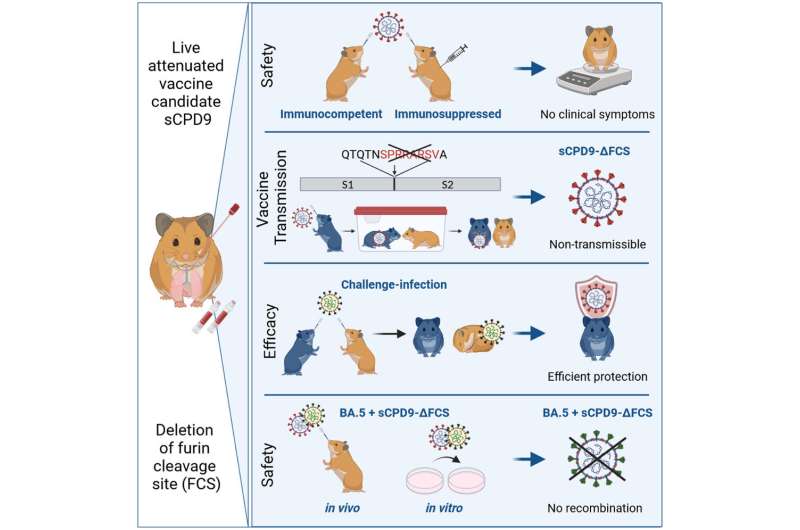This article has been reviewed according to Science X's editorial process and policies. Editors have highlighted the following attributes while ensuring the content's credibility:
fact-checked
peer-reviewed publication
proofread
Nasal vaccine against coronavirus further improved

After having successfully tested a mucosal vaccine against coronavirus in animals just months ago, Berlin scientists have now further developed their live SARS-CoV-2 vaccine. Researchers at Freie Universität Berlin have increased the safety of the vaccine, which is administered via the nose. The results of their study on the modified form of the live vaccine have been published in Molecular Therapy.
In early April 2023, a team of scientists from several Berlin research institutions presented a live SARS-CoV-2 vaccine in the journal Nature Microbiology, which has superior efficacy compared to intramuscularly administered vaccines. In preclinical trials, this vaccine, administered via the nose, produced better immunity at the mucous membranes of the respiratory tract than vaccines administered intramuscularly that were previously being used.
The nasal vaccine described in Nature Microbiology is a so-called live-attenuated vaccine. For this, the SARS-CoV-2 virus was modified in such a way that it no longer causes disease, but is still able to penetrate cells in the body and thereby trigger an effective immune response. With live vaccines like this one, high safety of use is paramount. The form of the preparation that was originally developed could still be transferred through close contact between laboratory animals.
Now the researchers are presenting a modified version of the vaccine in the journal Molecular Therapy. This variant of the vaccine is no longer transmissible due to a targeted change in the spike protein of the virus, but has the same efficacy. This innovation leads scientists to expect that, when used in humans, a vaccinated person cannot transmit the vaccine to an unvaccinated person, even in close contact.
"A non-transmissible vaccine virus could prevent unintentional spread of the vaccine in a population," says Dr. Jakob Trimpert, veterinarian and working group leader at the Institute of Virology at Freie Universität Berlin. Beyond the question of contagion, the current publication also sheds light on other essential aspects of the vaccine's safety.
The safety and efficacy of the live vaccine developed at Freie Universität Berlin, which has now been demonstrated in several studies, gives reason to hope for good results in the upcoming clinical trials in humans. To conduct these studies, Freie Universität Berlin is working closely with the Swiss company Rocketvax AG, a subsidiary of Swiss Rockets AG.
Dr. Vladimir Cmiljanovic, CEO of RocketVax, stated, "The results of these studies have important implications for the development of a highly safe and effective nasal vaccine against coronavirus. The modified version of the vaccine presented in the journal Molecular Therapy eliminates the problem of unintended spread and represents a significant advance in vaccine safety."
"This breakthrough brings us closer to the successful introduction of this live-attenuated vaccine in upcoming clinical trials and gives us hope for comprehensive protection against COVID-19."
More information: Julia M. Adler et al, A non-transmissible live attenuated SARS-CoV-2 vaccine, Molecular Therapy (2023). DOI: 10.1016/j.ymthe.2023.05.004





















